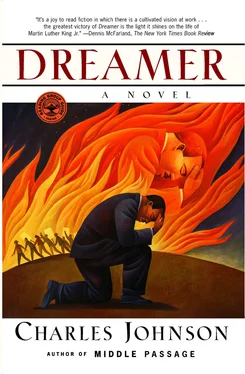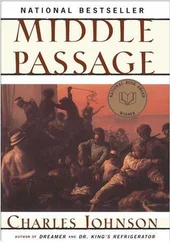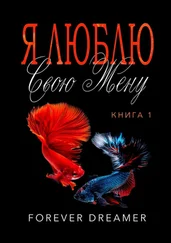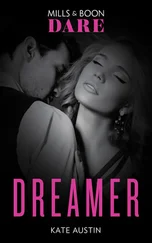“Yes, and what I think is you should get some rest.”
“I’ll sleep here on the sofa. And, Ralph?”
“Yes?”
“Thanks.”
It was quarter to four.
Abernathy stood, clicked off the television and then the lights, and, after tossing a blanket over his friend, returned to his own bedroom.
In the darkness, on the stiff cushions of the sofa, he tossed and turned, trying to find a comfortable position that might beckon sleep, grappling with the perennial dilemma of his public ministry, how to end evil without creating evil; then mercifully his eyelids grew heavy. In the region between waking and slumber he relived his trip to Kerala, feeling the heat, and watching the locals hang pots on coconut trees to collect their milk; but the heat fermented the sweet milk, which became so intoxicating that crows sipping from the pots fell drunkenly to the ground and stumbled about cawing at the wrong time of day. For a few moments he dreamed of journeying there again for the rest he needed so badly, and to probe deeper into their concept of Maya — the world as itself a cradle-to-crypt dream, in which all men were caught and only the blessed allowed to awaken. He looked at his watch. Four-fifteen. He sat up slowly, knowing this was all the sleep he would have this night. Knowing he would have to return to Tennessee. To make things right. To undo the damage. The Washington campaign would have to be postponed. In Memphis, nonviolence was being tested — he was on trial. Already he was clear on the new itinerary. Check out of this room. Call his wife. Hold a press conference. Fly back to Atlanta for a furious week of meticulous preparations, then return to this war-torn city for a second demonstration and, for himself, a fuller, deeper, and more perfectly realized broken heart.
On the evening of April 4 (Thursday) one hundred and twenty-five American cities began erupting in flame: a prophet had fallen. Pronounced dead at 7:05 P.M. The electrifying, awful report that a metal-jacketed 30.-06 bullet brought down the man who was the nation’s moral conscience, ripping away the right side of his jaw and neck, severing his spine on the second-floor balcony of the Lorraine Motel, spread through this splintered world like a declaration of war. There came a confusion of tongues in a house divided against itself. “Nonviolence is a dead philosophy,” proclaimed Floyd McKissick, “and it was not the black people that killed it. It was the white people that killed nonviolence, and the white racists at that.” So many agreed with McKissick. “Get your gun,” shouted Stokely Carmichael. “When white America killed Dr. King, she declared war on us!” The rioting and looting that Citizen King had loathed lasted for ten days in a blood-drenched decade that left everyone perpetually short of breath. In Texas, white students cheered when they heard he was dead. (I am not ashamed to say I hated them.) In Washington, D.C., seven hundred blazes blackened the sky. Tendrils of smoke drifted through windows in the White House, where Lyndon Johnson designated Sunday, April 7, a day of national mourning. Flags were lowered to half-staff. Schools closed. The baseball season was postponed. Three networks broadcast his funeral for six hours. Docks were shut down. Pope Paul VI cried out that this “cowardly and atrocious” killing of our better brother “weighed on the conscience of mankind.” It was four and a half years since JFK’s murder. Four years since Malcolm X’s. Robert Kennedy (only two months away from the bullet that would end his life in Los Angeles) had three extra telephones installed in Coretta’s home and chartered an Electra jet to bring the body of Atlanta’s finest son — now dwelling in a house not made with hands, eternal in the heavens — home to lie in state in the Sisters’ Chapel of Spelman College. We had never, I knew, been equal to him, or to the transcendent tasks he called us to perform. He was destined for vaticide. Before this ritualistic blood ceremony, this foundation sacrifice, ended, forty-six people were dead. Whites, pulled from their cars, were beaten mercilessly and stabbed. Two thousand six hundred people were injured. Another twenty-one thousand were arrested, myself and Amy among them at an April 5 demonstration in Chicago, where I’d returned to school.
By Tuesday of that longest week in modern history, I stood in sweltering heat outside Ebenezer Baptist Church in Atlanta, travel-worn and with a bad case of trench mouth. The corners of my eyes were crusted after the long drive from Illinois. My hair was uncombed and dry, the scent in my clothes was the aroma of sweat commingled with fried chicken eaten on the road. My mind felt like a freshly opened grave. I was one of sixty thousand people encircling the building where King was baptized and raised, listening, on a sun-heavy street beneath a cerulean sky, to Dr. L. Harold DeWolf and Rev. Ralph Abernathy on a loudspeaker because we — Amy, Mama Pearl, and myself — were unable to get inside, where nearly eight hundred mourners filled the pews. These, of course, were the dignitaries: Carmichael, who came with his bodyguards, entertainers like Harry Belafonte, Sammy Davis Jr., and Dick Gregory, all of whom had marched arm-in-arm with King. (Marion Brando pledged ten percent of his earnings to the Cause.) The politicians were there too, particularly the ones running for president that fall (Eugene McCarthy and Richard Nixon, but Hubert Humphrey came instead of LBJ), and we saw the nations other grand woman of sorrows, Jacqueline Kennedy, enter the crowded church as well. On and on they came to pay their last respects in public, the hypocrites and true bearers of homage to the colored man who died for our collective racial sins and spiritual failures. I felt no need to be inside with them, but as I listened to Abernathy’s eloquent speech, my head felt light. My knees buckled a little. Amy, perspiring on her upper lip, put her arm around my waist to steady me. “Are you going to be okay?” I didn’t know the answer to that, or to a thousand other questions that had troubled my sleep since King fell in the crosshairs of that high-powered rifle.
But this much I did know:
The day before he died, the sky above Memphis was turgid, the spring air moistened and charged by electricity from a thunderstorm the night before. As I said, I was back in school, studying Brightman, as he’d asked me to do, but I called his hotel on the evening of the third. The whole city knew where he was staying because his room number had been broadcast on several radio stations. He’d picked the Lorraine Motel to stay at after an article appeared in a Memphis paper criticizing him for running away to the Rivermont after the earlier aborted march down Beale Street (it was Bureau copy, of that I was convinced). When he returned to Memphis, detectives assigned to protect him met King at the airport but left after someone in his entourage shouted, “We don’t want you here.” Local organizers hurried him off to the Lorraine, lodgings that one of his aides, Hosea Williams, found confusing, since they had never stayed there before. He was originally given a room (306) on the ground floor, then reassigned to the second floor (305), and Abernathy was put in the first room. I reached him at about 4 P.M. Tired, he said all he wanted to do that evening was rest before spending most of the next day with organizers for the march. He’d toyed with the idea of finding someone to substitute for him at a rally he was slated to attend at the Mason Temple, and in the end decided to let Abernathy do it for him.
But when Abernathy reached the Mason Temple he found the crowd clamoring for King. That night they would accept no stand-ins. Wearily, the minister changed out of his pajamas and was driven to the temple in pounding rain with Andrew Young and Jesse Jackson (wearing bluejeans and a brown jacket). Without a text, he thundered oratory that made the audience forget the storm lashing the temple’s windows. “I want you to know tonight that we as a people will get to the Promised Land,” he said. “I’m so happy tonight. I’m not worried about anything. I’m not fearing any man. Mine eyes have seen the glory of the coming of the Lord. I have a dream this afternoon that the brotherhood of man will become a reality … With this faith we will be able to achieve this new day, when all God’s children — black men and white men, Jews and Gentiles, Protestants and Catholics — will be able to join hands and sing with the Negroes in the spiritual of old. Free at last! Free at last! Thank God Almighty we are free at last!’” And when he was done, and turned away from the bank of gleaming microphones, it seemed he fell, exhausted, toward Abernathy, who rushed with outthrown arms to embrace and steady him on his feet.
Читать дальше












